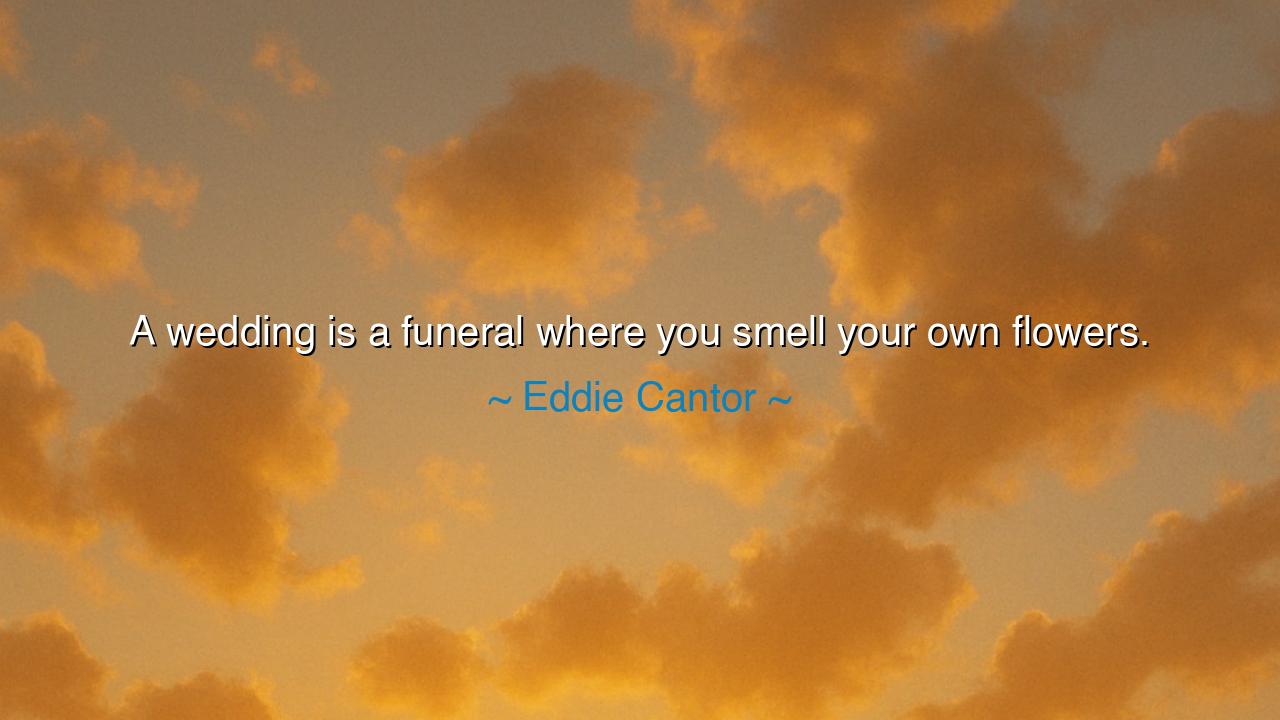
A wedding is a funeral where you smell your own flowers.






“A wedding is a funeral where you smell your own flowers.” Thus spoke Eddie Cantor, the famed comedian and entertainer of the early twentieth century, whose laughter often concealed deep truths about the human condition. In this line, wrapped in humor and paradox, he reveals the ancient wisdom that marriage, though a celebration of life and love, is also a kind of death—the ending of one existence and the beginning of another. The flowers, symbols of beauty and reverence, are the same for both ceremonies: at a wedding they honor new life joined in love, at a funeral they honor the life that has passed. Cantor’s wit, then, is not mockery, but insight. He teaches that in every beginning, something must end; and that love, in its truest form, requires the sacrifice of the self.
To understand the origin of this wisdom, one must look at Eddie Cantor himself. He lived in an age of shifting values—between the laughter of the Roaring Twenties and the sorrows of the Great Depression. Through humor, he captured the contradictions of life: that joy and sorrow, birth and death, are not opposites but partners. His jest about weddings and funerals is not cynicism, but recognition that marriage transforms identity. When a man or woman marries, they bury a part of their former life—the self that lived only for individual dreams—and step into a new existence where “I” becomes “we.” It is a funeral, yes, but a holy one, where the self dies to give birth to unity.
In the ancient world, too, this paradox was known. The philosophers of Greece and the mystics of the East spoke of love as a kind of death and rebirth—a surrender of the ego to something greater. Plato, in his Symposium, described love as the soul’s search for wholeness, a journey that demands the death of pride. In marriage, as in spiritual union, one must let go of self-centered desire to discover something immortal: a shared soul. The wedding, then, is the funeral of selfishness, the burial of solitude, and the resurrection of partnership. The flowers symbolize this duality: the beauty of what ends, and the fragrance of what begins.
Consider the story of Cleopatra and Mark Antony, whose love burned brighter than empire, yet cost them everything. In their union, they found a passion that defied nations, but in that love, both their former selves—the ruler and the general—were consumed. They were reborn as lovers but doomed as sovereigns. In their final moments, surrounded by the scent of flowers and death, they embodied the truth of Cantor’s words. Their love was both wedding and funeral, creation and destruction intertwined. Such is the power of deep union—it transforms, even unto the end.
Cantor’s quote, though humorous, also reflects the wisdom of endurance. For marriage, like life, is not sustained by joy alone. It requires mourning for the past selves left behind—the freedom of solitude, the unshared ambitions, the simple certainties of youth. To stay married is to learn, again and again, to let go of what no longer serves the union. Thus, each season of marriage brings its own small funerals—and its own rebirths. The laughter of the comedian conceals the teaching of the sage: that love, to be real, must die a thousand times and yet still live.
And yet, in this death, there is beauty. To “smell your own flowers” is to be conscious of transformation—to celebrate the loss as sacred. The one who marries should not mourn the life that ends, but honor it, as we honor the deceased with blossoms and song. For in love’s surrender, one does not lose life, but transcends it. The selfish “I” dissolves, and from it emerges something greater—a partnership, a legacy, a shared dream. In this sense, Cantor’s humor becomes prophecy: the wedding is the funeral of isolation, and the birth of belonging.
So, my listener, when you hear Eddie Cantor’s words, do not take them as jest alone, but as truth disguised in laughter. Let them remind you that every sacred union demands courage—the courage to die to oneself, to release the comfort of independence, to embrace the unknown that is life shared with another. When love calls you to change, do not resist; when time asks you to let go of who you were, do so with grace. Smell your own flowers, and rejoice that you are still alive to do so.
For in the end, love’s death is never final. It is the death that gives life, the burial that blooms, the silence that sings. The wedding, like the funeral, honors transformation—and those who walk through it with open hearts will find that what is lost is nothing compared to what is gained. Thus, laugh with Eddie Cantor, and remember: to love truly is to die beautifully, and to live forever in the fragrance of what you have become together.






AAdministratorAdministrator
Welcome, honored guests. Please leave a comment, we will respond soon